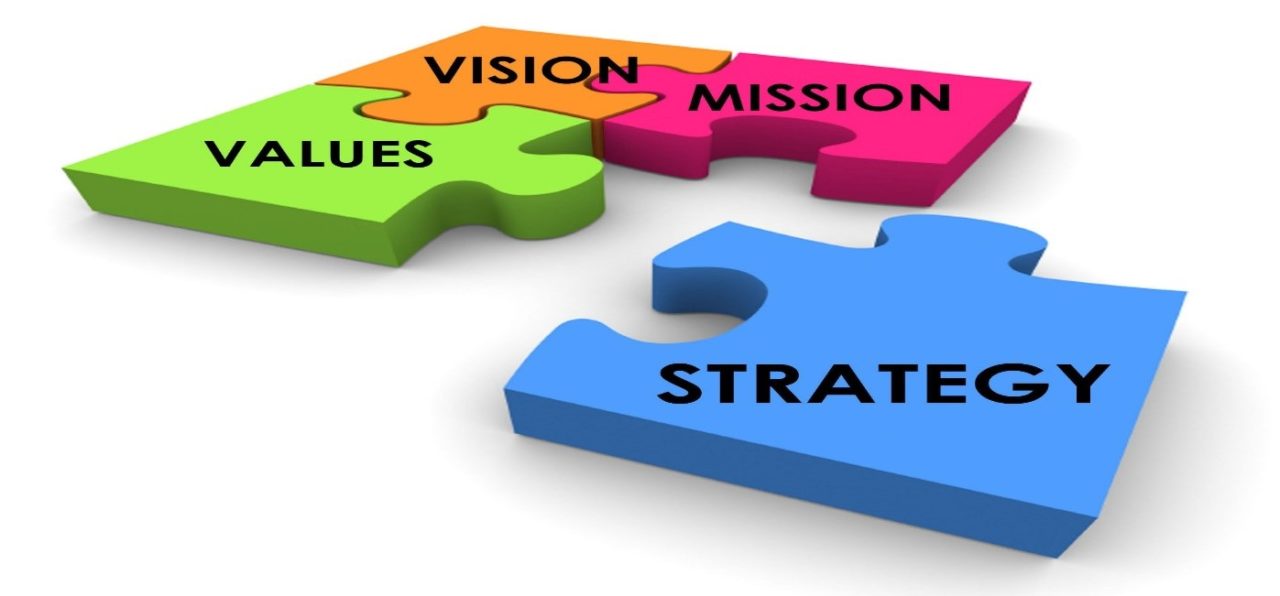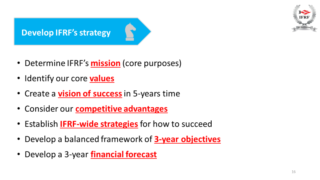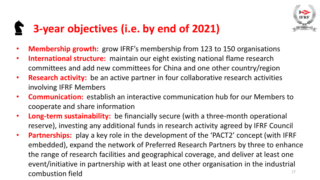-
New Year… New Plan! (Part 2 – Refresh strategy)
Date posted:
-
-
-
Post Author
Philip SharmanIFRF Director
-

-
In the first IFRF blog post on this topic (‘Part 1 – Review Position’), we began to ‘roll-out’ the results of our Strategic Review of IFRF as at the end of 2018 (‘SR 2018’) and, alongside it, to outline a new Three-Year Plan for the organisation to take us into the next decade (‘TYP 2019-2021’).
We started by sharing with you the ‘outputs’ from the first stage of our four-stage strategic planning process, namely ‘Stage 1 – Determine IFRF’s Position’, seeking to address the question “Where are we now?” by reviewing and pinpointing IFRF’s position at the end of 2018).
In the second blog post in this mini-series, we want to share with you the outputs of ‘Stage 2 – Develop IFRF’s Strategy’, addressing the obvious follow-up question “Where do we want to be?”, i.e. deciding where IFRF wants to get to, by when, and devising and refining an appropriate strategy.
So, let’s have a look at the outputs of Stage 2…
Where do we want to be (and by when)? A ‘re-visioning’ of IFRF’s strategy
In deciding where IFRF wants to get to, by when, and devising and refining an appropriate strategy to achieve this, a number of key future aspects of IFRF were considered by the Delivery Team in conjunction with the IFRF Council – see the summary slide below.
![]()
Firstly, it is vital that IFRF has a suitable ‘mission’ (core purpose) for the next three years. We wanted the statement of this mission to cover our ‘value proposition’ (i.e. why we exist), our ‘business statement’ (i.e. the field of industrial combustion research) and capture our ‘philosophy’ (in the shape of our key values – discussed below). The agreed mission for IFRF for 2019-2021 is:
IFRF’s Mission: Advancing applied research for safe, clean and efficient combustion, and facilitating cooperation, information sharing and research capacity development throughout the international combustion community.
This mission statement builds on our previous statement by expanding our value proposition to include capacity-building in the combustion research domain and incorporating (and reordering) the three key aspects of combustion that we consider paramount (safety, environmental acceptability and efficiency) and which are central to our values and vision (see below).
Since its earliest days, IFRF has undertaken its mission in accordance with a number of unwritten core ‘values’ that have marked it out in the research field and helped to build the respect in which it is has been held over the last seven decades. We wanted to identify and capture these external values, but also to consider how they should underwrite how we operate internally (i.e. in our policies and procedures, and our practices with partners, staff, contractors and contacts). As a result, we have agreed the following values with our Council:
- Openness: to encourage open sharing of information and results concerning combustion research (and to be transparent in how we operate).
- Cooperation: to encourage greater cooperation (and, where appropriate, collaboration) in combustion research activities.
- Efficiency and environmental sustainability: to strive for greater efficiency and environmental sustainability in combustion processes (and in how we operate).
- Safety-conscious: to promote the paramount importance of safety, alongside efficiency and sustainability, in industrial combustion (and within IFRF’s own activities).
- Researcher development: to foster the development of combustion researcher capacity (and of our own people).
- Trusted: to be regarded as a reliable research partner and a trustworthy source of information on industrial combustion research.
- Digital transformation: to identify and utilise suitable and relevant digital technology to enhance the services we provide to our members, and to encourage its wider use throughout the community.
- Equality and diversity: to encourage greater equality, diversity and inclusion within the combustion research community (and our activities and organisation), in particular better gender and age balance.
Based on our updated mission and core values, we were able to develop a ‘vision’ of what success would look like for IFRF over a five-year timeframe:
IFRF’s Vision: By 2025, to be the international reference point for industrial combustion research that is safe, clean and efficient.
Again, the changes from our previous vision are subtle but important – the new vision is ‘time-bound’ and reflects the rising importance of safety to our industrial members.
Reflecting the image at the beginning of this blog post, having put the ‘Mission’, ‘Values’ and ‘Vision’ jigsaw pieces into place, and with the benefit of the various analyses conducted in Stage 1 to enable us to understand our current position, we can now move on to consider our strategy for moving IFRF forward…
As part of formulating any future strategy, it is important to have some understanding of the ‘competitive advantages’ of IFRF with respect to other organisations in the industrial combustion research field (or wider but with a similar remit). This took the form of a simple ‘competitor analysis’ of IFRF versus eight other organisations – although we hasten to add that we consider cooperation and collaboration as far more in line with our values than competition – against a series of criteria. The other organisations we looked at were: the Air & Waste Management Association (AWMA); the American Society of Mechanical Engineers (ASME); the Combustion Institute (CI); the European Research Community on Flow, Turbulence & Combustion (ERCOFTAC); ETN Global; the Fuel and Energy Research Forum (FERF); the International Waste Working Group (IWWG); and VGB Powertech. The criteria considered were: the frequency of communication with members; the social media presence; membership benefits; and membership fees. From this simple analysis, the following conclusions were drawn:
- IFRF has more regular direct communications with its members than these other organisations (this frequency of communication is also at the level generally preferred by our members – see the results of the 2018 Member Survey).
- IFRF’s ‘Monday Night Mail’ e-newsletter compares very favourably with the best of the newsletters produced by these other organisations with regards to its modern look and content.
- IFRF’s social media presence is growing steadily from a very low base in 2016, with room for further growth and improvement.
- IFRF’s membership benefits are strong and comparable with the other organisations examined. Other benefits that could be developed that would strengthen our offering further include:
- providing access to ‘specialised networking groups’;
- developing project collaboration opportunities; and
- offering research capacity-building activities including training courses.
- IFRF member fees are broadly competitive.
In the light of these conclusions and all the various preceding activities in Stages 1 and 2, a number of IFRF-wide strategies were then developed – in consultation with the IFRF’s Council – that will support IFRF to fulfil its mission and help to realise its longer term vision of success, while remaining consistent with our core values. These strategies are to:
- Grow IFRF’s membership (maintaining the existing eight National Committees, but focusing on growth in Asia and in the southern hemisphere).
- Develop a broader technical coverage (including emerging fuels, a broad definition of ‘combustion’, a wide range of applications and scales, and key enabling technologies), all within an ‘energy systems’ context.
- Re-establish research activity in IFRF during 2019 (with our ‘Preferred Research Partners’ and via wider collaborations).
- Keep the cost base low, but increase the staff resource incrementally (as it can be afforded within IFRF’s cashflow).
- Continue to transform IFRF into a ‘digital organisation’, with our new website at the centre.
- Deliver a dynamic programme of events – Conferences, Topic Oriented Technical Meetings (TOTeMs), national Flame Days/Symposia, webinars, etc. (in conjunction with our National Committees).
- Develop a number of ‘specialised networking groups’ within our membership, and support these via our digital platforms (e.g. webinars, social media, etc.).
- Re-establish IFRF training courses (both ‘real’ and ‘virtual’/web-based).
Pulling together all of the various ‘strands’ that have emerged from Stages 1 and 2 of the strategic planning process, we have developed a set of three-year objectives for 2019-2021 as follows:
![]()
These objectives, along with an accompanying three-year financial forecast, establish the strategic framework for our Three-Year Plan.
In the final of these three blog posts (due out in the MNM of 4th February), we will present IFRF’s Three-Year Plan out to the end of 2021 (Stage 3 of our strategic planning process) and report on how we will be monitoring and managing our progress against this plan (Stage 4).
Don’t miss it…!


